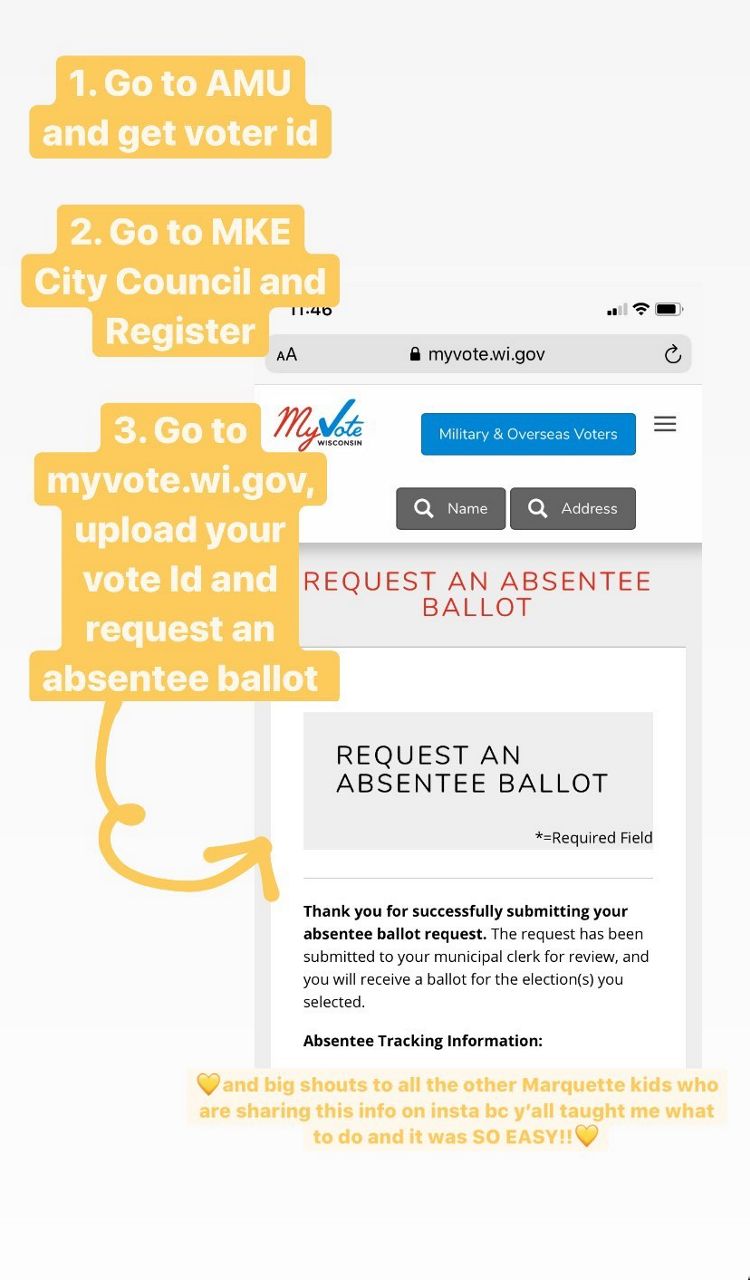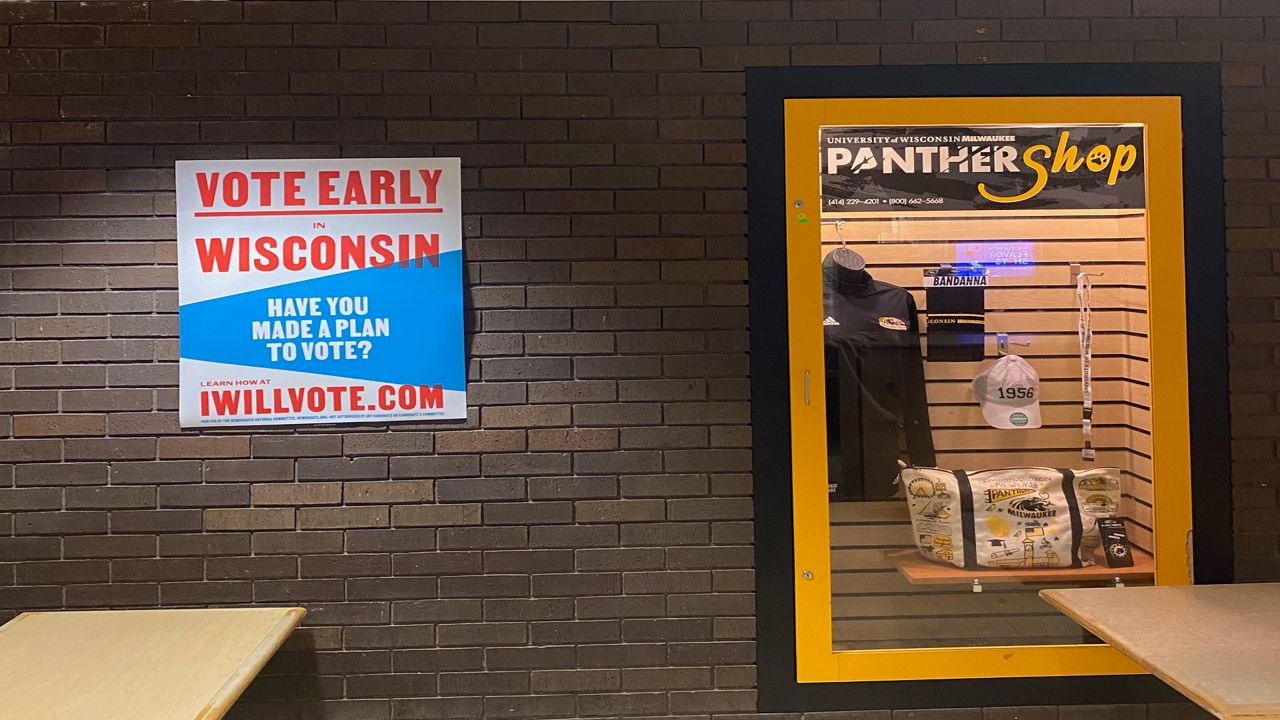MILWAUKEE— Dropping an absentee ballot into a box wasn’t how Sofie Manglano imagined voting in her first presidential election. But, of course, the Marquette senior also couldn’t have predicted the rest of this historic year: a global pandemic, a massive protest movement, an intensely divided nation.
“It would have been really cool to stand in line and go to the polls for my first election. But I mean, as the year is going, as long as I can vote I’ll do it,” Manglano says. “I see this as a life-changing, altering election. And I am so grateful that I’m old enough to vote.”
Manglano is one of many young voters whose own political “firsts” are happening in a year that’s unprecedented on many fronts. And these new voices have the potential to make a major difference: Wisconsin is the state where young voters have the greatest potential to impact the election, according to an analysis by Tufts University researchers.
In the past, young Americans have voted in smaller numbers than their older counterparts. In 2016, voter turnout was just over 46% among 18- to 29-year-olds, compared to a 71% rate for citizens older than 65, according to Census Bureau data.
But this year could see that trend change, as polls have shown that significantly more young Americans are planning to cast their ballots than in past elections. Manglano and some of Wisconsin’s other Gen Z-ers are among those who feel a real responsibility to not take their newfound voting rights for granted.
“Sometimes I feel like, Oh, my God, what can I possibly do as a 21-year-old college student?” Manglano says. “And voting, not that it's always the biggest, but it's to me one of the more fundamental, concrete ways I can at least really try to enact change.”
Jumping through hoops
When Mallory Manfredini filled out her absentee ballot this year, a mix of emotions ensued.
First came the new voter stress: Did she bubble in her picks correctly? Was her signature in the right spot? Would her vote count?
But after checking and re-checking her ballot, Manfredini, who’s 21 years old and first-time presidential voter, felt excited that she’d done what she calls her civic duty.
“You're doing such a simple thing that could have a really powerful effect in the country that we live in,” she says. “So I felt good putting it in my little voter box.”
Manfredini says just about all of her friends are registered and ready to vote this year — a big change from when she first turned 18 and “nobody was voting” in local or midterm elections.
Hannah Bright, another Marquette senior, actually was old enough to cast her ballot in the 2016 election, but agrees that this time around feels different.
“I definitely think there is a little bit more of a sense of urgency in this election,” Bright says.
Part of the change is that the political environment and general current events have been, as Manfredini puts it, “intense.” Another factor they point to: social media, where students are sharing step-by-step voting guides and other resources.
Navigating the registration process can be a bit daunting, Bright says. With the various administrative steps involved, some new voters may lose steam partway through — a factor experts have agreed may be one of the major drivers of low young voter turnout.
“There’s just a lot of factors that go into it that I don’t think are made explicitly clear,” Bright says. “I personally don’t believe that it’s a lot of people just choosing not to vote, but there are a lot of hoops you have to jump through.”
Bright is part of an outreach organization on campus called Marquette Votes, where she tries to guide other young voters through those hoops. But students have also taken it upon themselves to keep each other informed; Manfredini and Manglano say voter guides shared on Instagram helped them navigate the process.
They say their school also offers some important support, like by offering Marquette Voter IDs for students from out of state who don’t have Wisconsin licenses.
Hundreds of other students have made the same move. As of Wednesday, 845 had already registered for their Marquette Voter IDs, according to associate communications director Kevin Conway. That number will likely grow, Conway says: In 2016, the school issued most of its 1,856 IDs on Election Day or the day before, after issuing 688 beforehand — a count that’s already been surpassed this year.
Manfredini says her vote feels “especially powerful” because of Wisconsin’s status as a battleground state. She’s from Chicago but chose to switch her registration over, in part because she felt her vote for Joe Biden would have more importance along Wisconsin’s tight margins.
And for Bright, who’s also from Chicago, choosing to vote in Wisconsin also mattered because of the down-ballot local items that will impact her current Milwaukee community.
“It was important for me because I personally have a stake in the community that I live in, and I want to see it develop and be the best it can be,” she says.
Getting educated
For her part, first-time voter Reilly Tracy is glad this presidential election is “unlike any other.”
Tracy, who’s also 21, says she sees people from her age group really thinking critically about their choices in this election, instead of just following in their parents’ footsteps. Especially with the constant connection of technology placing “everything at our fingertips,” she says it’s almost become hard to go about the day without thinking about politics.
“Since we’ve been in quarantine, every story, every post has an intention now,” she says. “It’s totally changed directions in a good way.”

These young voters agree that conversations on social media have been important to keep engaging with the election and the slew of other issues facing the world right now. But they’re also wary: Manglano says she makes an effort to dig deeper and not fall into the trap she describes as, “I read a sentence and now it’s my opinion.”
Getting — and feeling — informed is key for young voters, as some experts say that young people hold themselves to a high standard on whether they know enough to vote. A 2018 poll found that ahead of the midterm elections, those in younger age groups were less likely to rate themselves as well-informed, and more likely to think that those who aren’t informed, shouldn’t vote.
Recent graduate Dan Brophy, 22, says factors like not getting enough training in civic education or media literacy can be major barriers for young voters. Brophy, who now works in research and advocacy, says institutions like colleges should pitch in to really keep young people engaged with democracy.
“Institutions of higher learning were initially created for the purpose of creating good citizens. So, helping young people understand, 'Why is democracy important? How do we sustain democracy?'” he says. “These questions that you're supposed to be asked as a young person, I think that's what higher education is for — and we’ve kind of moved away from that.”
Still, Brophy says he’s been encouraged by how much energy his age group is bringing to this election, even those who haven’t been involved in politics before. He says he’s hoping to move past “political entertainment” and back into more policy discussions.
Other young voters also seem ready to talk policy: They cite topics including racial justice, women’s rights, education, immigration policy, economics, gun reform, and LGBTQ issues as subjects they care about in this election.
While Manglano says her underlying stance has been steady — “I want everyone to have equal opportunities,” she says — the past few years have helped her figure out how to apply that to politics.
“Four years ago, I was in no way as politically informed or educated, or striving to be. And not out of necessarily conscious ignorance, but I was just like, 'Oh, I could never understand any of this stuff,'” Manglano says. “And now, I’m like, 'OK, you are a smart, educated young woman. You can absolutely understand all this, and take that understanding and turn it into action.'”
‘What more can I do?’
Once Manfredini had dropped off her ballot, she says she quickly texted her dad: “Sigh of relief, now waiting with anxiety.”
With just under two weeks until Election Day — and likely a while longer until all the ballots get counted — these voters say they’re nervous to see what the future holds. But many of them aren’t simply waiting around.
To stay engaged, Manfredini and Bright, who both study Spanish, plan to spend Election Day serving as bilingual poll workers in Milwaukee.
In such an important election year, Manfredini says she found herself asking, “What more can I do?” Working at the polls seemed like a way to help others while also learning more about the political process.
Plus, the two point out, the pandemic has heightened the need for poll workers: Last week, the Wisconsin Elections Commission reported that 51 communities across the state were facing “critical or serious” shortages of workers. As young and healthy people who are less vulnerable to COVID-19’s most severe effects, Bright felt she could fill in for the older volunteers who usually show up.
Bright is also continuing her work with Marquette Votes, which is offering a nonpartisan “walking buddy” program to escort students to the polls. Plus, she’s taken to being “that annoying friend” who texts all her loved ones and makes sure they have their voting plans set.
“I just think that it’s really easy to take being able to vote for granted,” Bright says. “But it’s something that is truly a privilege that so many people have fought and died to be able to vote — and it’s a duty that we have as well.”
Brophy is continuing his canvassing and phone banking work with Milwaukee advocacy group Voces de la Frontera. He says he’s interested to see whether the momentum from this election will last beyond Nov. 3, or if young people will “check out” once the election is done.
Manglano has also been phone and text banking, which she says has been interesting, even though the reality involves a lot of people hanging up on her.
Generally, she says she’s felt “empowered” to be part of such a major election year — one that her kids and grandkids will read about in their history books — even at such an early point in her own life.
“It’s just so crazy. We're so young, and our lives aren't necessarily concrete, but all these news and events that are really striking the whole country are hitting us,” Manglano says. “And we're like, OK, I'm just trying to be in my 20s and figure out what I'm going to do with my life.”



